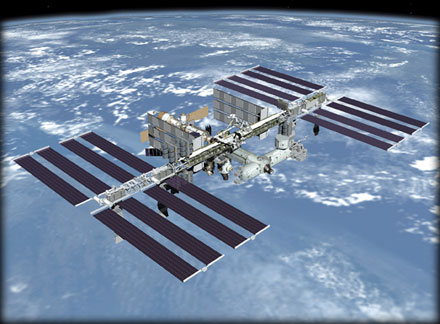Science, the pillar of strength for peace and development
By Pramod DE SILVA
The two words ‘Peace’ and ‘Development’ go hand in hand, because
peace is essential for development. We have first-hand experience of
this truism. For 30 long years, terrorism stifled development in the
North and the East and affected development, to some extent, in the
other regions as well. Now that peace has been restored, development has
come to the fore in all areas of the country.
However, there is no development without technological advances. In
fact, practically everything that we take for granted in our lives, from
light-bulbs to cars to microwave ovens, is a result of scientific
research and innovation. Thus science (and technology) can be described
as the bedrock of development.
 |
|
The International Space Station, a
project where many countries work together for a common goal |
Science, however, can be used for both good and bad purposes. In
fact, the very same technology could be a double-edged knife. Atomic
energy is a prime example. It could be used to build a nuclear weapon
(remember Hiroshima and Nagasaki?) or a nuclear power station. There
should be a thrust towards using science only for good causes.
The UN has recognised the role of science as a facilitator of peace
and development. This concept is reflected in the proclamation by the
UNESCO General Conference in 2001, of the World Science Day for Peace
and Development on November 10 every year. It is also known in some
countries as the International Science Day.
The purpose of the World Science Day for Peace and Development is to
renew the national, as well as the international commitment to science
for peace and development and stress the responsible use of science for
the benefit of society. The World Science Day for Peace and Development
also aims at raising public awareness of the importance of science and
to bridge the gap between science and societies.
Protecting environment
These principles are embodied in the UN ‘Science and Peace
Resolution’ which addresses all the main aspects of the relation between
science and peace. It affirms the role of science in:
*Promoting international peace, security and co-operation;
* Promoting human rights;
* Promoting the social and economic development of mankind;
* Protecting the environment.
The Day is also an occasion to remember the UNESCO’s mandate and
commitment on science. Director-General of UNESCO Irina Bokova said:
“2012 must be a turning point towards green societies, built on the
inclusive and equitable development of science to the benefit of all.”
Science is necessarily an international endeavour, especially in
cases where one country alone cannot fund the next frontiers of research
and innovation. The International Space Station is one such
international project, with many countries working together for the
common goal of improving space exploration. Even a mission to Mars now
looks increasingly likely to be a collaboration of the leading space
agencies.
However, before we reach out to the stars, there are many other
worthy projects that can get off the ground right here on Earth. The
recent climatic disasters around the world including Hurricane Sandy in
the United States show that we are yet to unravel the mysteries of
nature, despite having the technology to wipe out the planet itself in a
matter of hours. Although there is a debate as to whether the likes of
Sandy are caused by climate change per se, the entire world is facing
that threat. This is another instance where countries should work
together to advance the common goals of science.
 |
|
Some of the best science inventions
have originated from university labs |
A good start can be made from schools, where science is often taught
as a theoretical subject. An effort must be made to inculcate the value
of science as a tool for peace and development in the real world among
students. They will then be motivated to undertake research projects
that benefit society later on.
This is also why governments must encourage student inventors. Many
Sri Lankan students have won worldwide acclaim in this endeavour and
their efforts should be further encouraged. Our universities too should
be centres of excellence for research- related activity - some of the
best inventions have originated from university laboratories around the
world.
Climate of peace
It is true that science can destroy lives, but it is equally true
that it can save lives in a climate of peace. Vaccinations alone have
saved more human lives than any other invention. A major challenge
before the world is feeding nine billion people by 2050.
The problem is that farming methods in Africa are just not developed
enough to cope. But science is coping – scientists have just
successfully developed a strain of virus-resistant cassava, which will
go a long way in feeding people. In Asia, the race is on to find better
yielding and disease-resistant rice varieties.
This also means that by boosting the products of plants, scientists
can develop new areas in the food industry - these stronger plants can
be used in animal feed and for other purposes. It creates jobs as well,
paving the way for a new bio-economy. However, to come back to our
topic, if most of Africa’s (and indeed elsewhere in the world) conflicts
end tomorrow, millions more can be saved from disease, starvation and
death.
We hear of new inventions every day. Fortunately, most of them are
directed at peaceful uses. Ironically, even defence and war-related
inventions can later permeate to the civilian realm. This includes the
Internet, through which some of you will be reading this article. Radar
is another military invention that has saved countless lives. The idea
here is that inventions in the defence sphere could turn out to be
surprisingly useful for everyday life.
However, that takes away the glaring reality that the world spends a
staggering amount of money on weapons and wars. Even if a fraction of
these funds can be diverted to science and development, the world will
be a much better place. If the rich world can afford to cut down on
their defence expenditure and help the Third World through science and
development projects, that would be a major victory for those who
advocate science strictly for peaceful uses.
|


